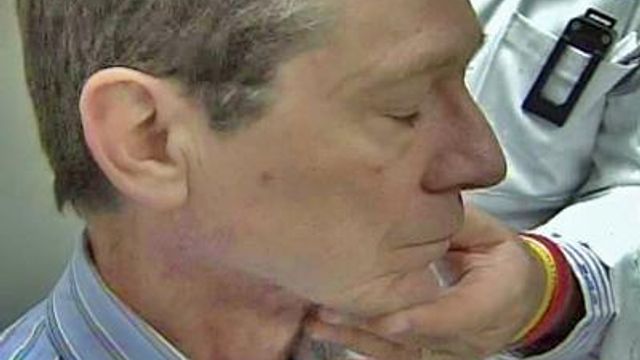Local Newspaper Editor Finds New Hope for Fighting Cancer
Durham Herald-Sun page editor Ron Landfried has lived a journey from fear to hope since he was diagnosed with cancer last summer.
Posted — UpdatedWhen a doctor says "cancer," hearts sink, and life plans go on hold. However, cancer patients and their families are finding hope in new technology, drugs and clinical trials.
Durham Herald-Sun editorial page editor Ron Landfried has lived that journey from fear to hope since last summer, when he noticed a slight problem in his throat.
"I was having difficulty swallowing," he said. Later, a lymph node swelled noticeably on his jaw. A biopsy showed it was malignant tumor on the back of his tongue.
Standard treatment, including surgery to remove the tumor, chemotherapy and radiation, offered a 70 percent chance of survival.
But a team of doctors, including radiation oncologist Dr. David Brizel at Duke University Medical Center, offered Landfried a place in a clinical trial. In addition to chemotherapy and surgery to remove the tumor, Landfried received six weeks of IMRT radiation, or intensity modulated radiation therapy.
Using computed tomography (CT) scans, Brizel designed a plan to use radiation, but spare surrounding tissues and structures, including the voice box and saliva glands.
"We are aiming multiple radiation beams at a tumor," he said.
The trial also included two drugs: Avastin, which cuts off a tumor's blood supply, and a pill Tarsiva, which targets tumor growth receptors.
Typically, the drugs are used to prolong the life of patients with incurable cancer or cancer recurrence, "but what we're trying to do is try to close the barn door before the horse is gone," said Dr. Brizel.
The treatments took their toll on Landfried, keeping him out of his editor's office for 10 weeks. He and his wife Ann Guill put on hold their future plans, including learning Spanish.
However, more than a year after completing treatment, Landfried is still cancer free, Brizel confirmed.
"For head and neck cancer, if it doesn't recur within the first year or two, there's a very good chance that it won't," said Dr. Brizel.
So Landfried said he feels as if he might have time to sign up for a Spanish course.
"It's a great gift to be able to return to those thoughts, you know, and to think again, 'Well, O.K., I do have time," Landfried said.
Duke is still enrolling patients in the trial, so Brizel said it's too early to draw conclusions. However, he says the research team is extremely pleased with the results so far.
• Credits
Copyright 2024 by Capitol Broadcasting Company. All rights reserved. This material may not be published, broadcast, rewritten or redistributed.





